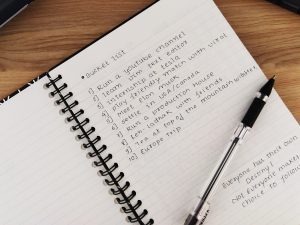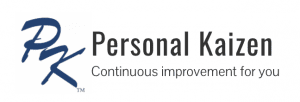We are sharing tips that will help you and other members of the Personal Kaizen community increase your productivity. Today’s post covers measurement and accountability – areas that are often overlooked – or avoided – by individuals. The most effective people practice personal kaizen – continual progress (every day) that compounds over time into massive achievement.
Measure What Matters
Legendary venture capitalist John Doerr wrote the New York Times bestseller Measure What Matters and suggests you:

- Focus and commit to priorities: What are your 3-4 most important goals? A short list of goals is easier to track and commit to getting done.
- Align and connect for teamwork: Find areas where you can have an “accountability partner.” For example, meeting a friend to exercise or walk together will help ensure you wake up and are on time. Otherwise, you will be letting a friend down.
- Track for accountability: It is critical that you write down your goals and keep track of your accomplishments. We share a few tips for holding yourself accountable below.
- Stretch for amazing: Include both committed objectives and aspirational (stretch) objectives. You want to have BHAGs or “bucket list” goals mixed in with the boring stuff!
SMART Goals
We have written about setting SMART goals in the past. The M in this acronym stands for Measurable – every goal and priority should have a measure of success. Here are a few tips for making your goals and priorities measurable:
- Set exciting annual and longer-range measurable goals – be sure some of your priorities are challenging goals that can be made simpler to show progress. This technique uses the compound effect to your advantage.

For example, let’s examine the goal – have one million dollars in a retirement account by age 65.
A 25-year-old would have 40 years to achieve this goal. Based on historical stock market returns of 10%, saving just $60 per week will get you to this goal! We recommend you motivate yourself with the bucket list goal of having $1,000,000, but measure and hold yourself accountable to the weekly goal of investing $60.
- Focus on measuring actions – As in the example above, measure your actions. If you want to write a book, measure how many pages you write per day. Focus on the action – or even getting ready to write – rather than how much. Make your goal a daily habit.
- Keep your measures small and achievable – For the goal of writing a book, we recommend you hold yourself accountable to writing just one page per day. This may not seem like much, but after only a year and a half, you would have over 500 pages written that could hopefully be edited down into a short book.
Tips for Holding Yourself Accountable
Once you have set SMART goals with simple, achievable measures of success, you will need to hold yourself accountable for achieving them. Measurement and accountability really go hand in hand! Here are a few hacks for holding yourself accountable.

- Write down your goals: A goal isn’t real unless it is documented. Write your goals down.
- Regularly review your goals: One of the most well-known personal improvement tips is to review your goals regularly. Make your goals so familiar that they become a part of your identity.
- Share your goals: Letting your friends, family, or coworkers know your goals will help hold you accountable for achieving them. Lack of progress will lead to a bit of guilt or embarrassment, whether or not they choose to comment.
- Use a coach or accountability partner: We mentioned the benefit of having an accountability partner earlier. This works so well that some people hire accountability coaches that will call them every day or week to check on their progress.
- Track your progress: My favorite technique is to track simple daily goals and not break the chain – or skip a day. We mentioned the goals of saving $60 per week or writing one page per day; I suggest you track your progress on a calendar with the goal of never missing a day.
- Plan to celebrate your success: When your actions begin achieving your desired results celebrate! Take time off. Plan a trip. If you write 10 pages in one day, reward yourself with a planned day off from writing later in the week. Be proud of your willpower.
Do you already incorporate some of these measurement and accountability habits into your daily routine? If so, let us know which one(s) in the comments below. If not, we challenge you to pick one this week and try it! Be sure to tell us which one you choose and share how it goes with the rest of the Personal Kaizen community.




